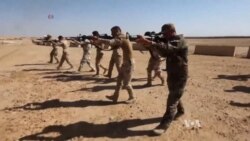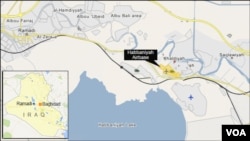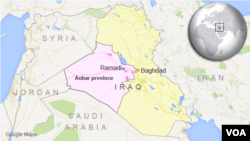President Barack Obama on Wednesday ordered 450 additional military advisers to Iraq in a new effort to bolster Iraqi troops as they try to retake Ramadi, the Anbar provincial capital seized last month by Islamic State insurgents.
The White House said the extra troops would not serve in a combat role and would augment the 3,100 trainers the U.S. already has in Iraq to "train, advise and assist" Iraqi forces and Sunni fighters.
But Obama is continuing to rule out sending ground troops back into Iraq after withdrawing them in 2011.
A statement said the president was adding the new advisers at the request of Iraqi Prime Minister Haider al-Abadi and the recommendation of U.S. defense chiefs.
"These new advisers will work to build the capacity of Iraqi forces, including local tribal fighters, to improve their ability to plan, lead and conduct operations against ISIL in eastern Anbar under the command of the prime minister,'' White House spokesman Josh Earnest said.
Under the plan, the U.S. would open a new training site at al-Taqaddum, a desert air base that once served as an American military hub, in eastern Anbar province. The move will increase the number of U.S. training sites in Iraq from four to five.
At the Pentagon, spokesman Colonel Steve Warren said the new U.S. forces could begin operations at al-Taqaddum in six to eight weeks. Their objective, he said, will be "to engage with the leadership of Iraqi units at the brigade and higher level and advise and assist them on how to conduct their operations.”
Involving Sunni fighters
U.S. deputy national security adviser Ben Rhodes said Wednesday that the advisers would give the U.S. greater capacity to strengthen Iraqi forces, while working with Sunni tribal fighters who are essential to coalition efforts to combat the Islamic State group. Most of the trainees would be Sunni tribal volunteers.
“What we’re trying to do here," the Pentagon's Warren said, "is bring the Sunnis into the fold, into the tent, so they can join with the Iraqi government, with the Iraqi security forces and defeat ISIL.”
Obama also ordered "the expedited delivery of essential equipment and materiel" to Iraqi forces, including Kurdish peshmerga troops and Sunni tribal fighters operating under Iraqi command, the White House said.
The expanded effort also will include delivering U.S. equipment and arms directly to al-Taqaddum, not unilaterally but under the authority of the government in Baghdad. This represents a change in the U.S. policy of providing arms only through the central government.
Obama has also ordered officials to intensify their efforts to "stem the flow" of foreign fighters into Iraq and Syria, out of fear they will eventually return to their home countries and carry out attacks, the statement said.
Obama acknowledged earlier this week that even after launching 4,400 aerial attacks against Islamic State positions in Iraq and Syria since September, the U.S. had not developed a "complete strategy" with the Iraqi government to train more of Baghdad's troops, especially Sunni tribesmen seen as key to retaking Ramadi. The Sunni tribes, he said, are not only willing and ready to fight Islamic State but have been successful at it.
The U.S. in the past year has trained about 9,000 Iraqi troops and is training another 3,000, but it is unclear how many more recruits Iraq will be able to supply.
With the Islamic State group's takeover of Iraq's second city, Mosul, a year ago, and now Ramadi, criticism of Obama's aerial-only bombardment of the militants has grown louder in Washington.
Democratic Senator Robert Menendez of New Jersey said reworking America’s strategy in Iraq was overdue.
"Obviously, our present strategy isn’t working. The key issue for me has always been: If we believe that ISIL is a national security threat, then you have to deal with the threat," Menendez said, referring to an acronym for the Islamist extremists.
He added that having better-trained Iraqi troops fighting the Islamic State group would be “desirable.”
By contrast, Republican Senator Lindsey Graham of South Carolina criticized Obama’s entire Iraq strategy as a “duct-tape approach."
"This is just adding capacity to a strategy that will never work. President Obama is fundamentally off track here. Five hundred [additional U.S. advisers] are too few to make a difference," said Graham, a 2016 Republican presidential candidate.
Ground troops ruled out
Graham advocated sending a small contingent of U.S. combat forces to Iraq, an option Obama has ruled out.
Political surveys in the U.S. show little public support for sending U.S. ground fighters back to Iraq.
At a Republican leadership news conference at the U.S. Capitol on Wednesday morning, House Speaker John Boehner of Ohio said sending additional military advisers to Iraq "is a step in the right direction, but as the president admitted the other day, he has no strategy to win."
Other critics, such as Senator John McCain of Arizona, the Republican chairman of the Armed Services Committee, were dismissive of Wednesday's decision.
"This is incrementalism at its best or worst, depending on how you describe it," McCain said.
The U.S. already trains Iraqi troops at four sites — two in the vicinity of Baghdad, one at al-Asad air base in Anbar province and one near Irbil in northern Iraq. There is another training center for special operations forces near Baghdad.
The Islamic State extremists have seized sizable areas of both Syria and Iraq, and Iraqi security forces, supported by militias, have been trying to reclaim areas near Ramadi since it fell to the militants last month.
On Wednesday, the U.S. Central Command said the U.S.-led coalition conducted 17 airstrikes against Islamic State targets in Iraq and Syria in a 24-hour period.
Also, Kurdish officials said an American man was killed fighting Islamic State militants alongside Kurds in Syria.
The State Department identified him as Keith Broomfield, but it gave no circumstances of his death.
Luis Ramirez and Aru Pande at the White House, Jeff Seldin at the Pentagon and Cindy Spang on Capitol Hill contributed to this report. Some material for this report came from AP and Reuters.








